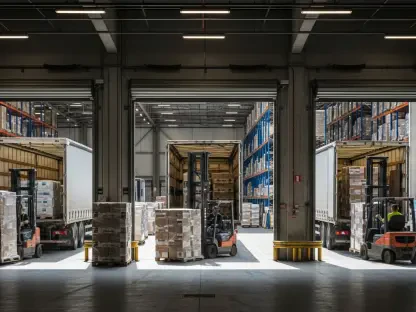Unveiling a New Era in Fleet Management
Imagine a UK transportation landscape where nearly 130,000 road incidents occur annually, driver shortages loom large, and businesses grapple with the mandate to transition to zero-emission vehicles by 2030. This is the harsh reality for fleet operators today, a complex web of challenges that demands innovative solutions to ensure safety and efficiency. Motive, an AI-powered Integrated Operations Platform, has stepped into this arena with its recent launch in the United Kingdom, establishing a London office and appointing Nyanya Joof as regional vice president. This strategic move aims to transform how industries like transportation, construction, and energy manage safety, costs, and sustainability.
The significance of this market entry lies in its potential to address critical pain points with cutting-edge technology. Fleet management in the UK is at a crossroads, burdened by escalating operational expenses, regulatory pressures, and a pressing need for safer roads. This analysis explores the broader market trends shaping the sector, delves into Motive’s role as a disruptor, and projects the long-term implications of AI-driven solutions for an industry hungry for change.
What follows is a detailed examination of the current state of fleet management, the specific innovations Motive brings to the table, and the future trajectory of this vital market. By dissecting data, challenges, and opportunities, this discussion aims to provide actionable insights for businesses navigating an increasingly demanding landscape.
Market Trends Shaping UK Fleet Operations
Historical Challenges and Modern Pressures
The UK fleet management sector has long been characterized by manual processes and fragmented systems, leading to inefficiencies and heightened risks. Historically, operators relied on disjointed tools that offered little visibility into vehicle health or driver behavior, often resulting in costly delays and safety oversights. Today, the industry faces a perfect storm of issues, including a projected shortage of 200,000 Heavy Goods Vehicle (HGV) drivers by 2030, which threatens to cripple logistics and supply chains across multiple sectors.
Beyond workforce constraints, economic factors such as rising fuel and insurance premiums continue to squeeze profit margins. Regulatory demands are also intensifying, with the UK’s commitment to sustainability pushing businesses toward electric vehicle (EV) adoption under tight deadlines. These mounting pressures highlight a market in desperate need of integrated solutions that can streamline operations while addressing both safety and environmental goals.
Transitioning from these entrenched challenges, it’s clear that the status quo is no longer viable. The convergence of economic strain and policy mandates creates fertile ground for technological disruption, setting the stage for platforms like Motive to redefine operational standards in this space.
Rising Demand for Safety and Sustainability
Safety remains a paramount concern, with recent data revealing a staggering number of road incidents impacting fleets annually. This statistic underscores the urgent need for tools that can proactively mitigate risks and protect drivers, a demand that has grown sharply as public and regulatory scrutiny intensifies. Businesses are increasingly held accountable for preventable accidents, driving a market shift toward solutions that prioritize real-time monitoring and intervention.
Simultaneously, sustainability has emerged as a non-negotiable priority, fueled by the 2030 Zero Emission Vehicle Mandate. Fleet operators face the dual challenge of adopting EVs while managing higher repair costs and longer service times compared to traditional vehicles. This transition is further complicated by uneven EV infrastructure across regions, amplifying the need for data-driven strategies to optimize adoption and minimize downtime.
These twin imperatives of safety and sustainability are reshaping purchasing decisions and investment priorities in the fleet sector. As companies seek comprehensive platforms to address both immediate risks and long-term environmental targets, the market is ripe for innovations that can deliver measurable results across these critical areas.
Motive’s Strategic Entry: Solutions and Market Impact
AI-Driven Safety Innovations
Motive’s platform enters the UK market with a robust Driver Safety solution, leveraging precise AI to detect risky behaviors such as mobile phone use or traffic violations in real time. This technology enables immediate coaching for drivers, aiming to prevent accidents before they occur, a critical feature given the high incidence of road collisions. By focusing on proactive risk reduction, the platform addresses a core market need that traditional systems have struggled to meet.
Additionally, the system fosters a positive work environment by rewarding safe driving practices, which can improve driver morale and retention—a significant concern amid labor shortages. While adoption may face hurdles related to workforce acceptance of AI monitoring, the emphasis on empowerment over surveillance positions this solution as a potential market differentiator. Its impact could redefine safety standards if scaled effectively across diverse fleet operations.
Shifting from safety to broader operational concerns, Motive’s approach also tackles the financial burdens that weigh heavily on UK businesses. This multifaceted strategy aligns with market demands for holistic tools that integrate various aspects of fleet management into a single, efficient system.
Cost Optimization and Operational Efficiency
In response to escalating costs, Motive’s Fleet Management solution offers actionable insights into fuel efficiency, vehicle health, and optimized routing. These tools directly combat the market trend of rising expenses by enabling data-driven decisions that lower fuel consumption and reduce insurance premiums through safer operations. For an industry grappling with tight budgets, such capabilities represent a lifeline to financial stability.
Unlike traditional systems that often require juggling multiple platforms, Motive provides a unified interface, enhancing visibility and simplifying management tasks. While the initial learning curve of adopting new technology poses a challenge, the potential for long-term savings on maintenance and operational costs could outweigh these barriers. This positions the platform as a competitive offering in a market hungry for efficiency gains.
Moving beyond cost control, another pivotal trend in the fleet sector is the push toward greener practices. Motive’s technology also addresses this growing demand, aligning with regulatory and societal expectations for sustainable operations.
Supporting the Electric Vehicle Transition
With the UK’s sustainability mandate looming, the transition to EVs is a defining challenge for fleet operators, compounded by higher costs and infrastructure gaps. Motive’s platform counters these issues with specialized tools like EV forecasting software, fuel-efficient routing, and predictive maintenance, recently bolstered by the acquisition of a battery intelligence startup, InceptEV. These features aim to ease the shift to electric fleets by minimizing downtime and optimizing performance.
Market analysis suggests that without such tailored solutions, businesses risk falling behind on environmental targets, as EVs can increase operational complexity if not managed effectively. Motive’s focus on actionable data helps bridge this gap, offering a clear path to compliance and efficiency. This innovation taps directly into a growing segment of the market, where demand for EV-ready tools is expected to surge over the next five years.
Looking ahead, the integration of AI in fleet management signals a broader transformation. Motive’s entry is not just a response to current needs but a precursor to future shifts that could redefine the competitive landscape for UK operators.
Future Projections: AI as the Backbone of Fleet Management
Emerging Technological Trends
The UK fleet management market is on the brink of a technological overhaul, with AI and integrated platforms poised to become central to operations. Projections indicate a growing reliance on data-driven systems that consolidate safety, cost, and sustainability metrics into cohesive solutions. Over the next few years, advancements in autonomous vehicle integration and predictive analytics are expected to further revolutionize how fleets are managed, reducing human error and enhancing precision.
Regulatory changes, particularly around emissions and data privacy, are likely to shape the adoption of these technologies. Stricter policies could accelerate the demand for compliant platforms, while economic factors like fluctuating fuel prices may push more companies toward automation for cost control. Market forecasts suggest that businesses slow to adopt AI risk losing ground to competitors who leverage these tools for operational resilience.
This evolving landscape points to a future where adaptability is key. As AI continues to mature, its role in anticipating and resolving issues before they arise could set new benchmarks, with Motive potentially leading the charge in establishing these standards.
Long-Term Market Implications
Looking further ahead, the integration of AI could fundamentally alter the structure of the fleet management market, creating a divide between early adopters and laggards. Companies that embrace platforms like Motive’s may gain a significant edge in efficiency and compliance, particularly as labor shortages and sustainability mandates intensify. Market projections estimate a substantial increase in demand for unified systems by 2030, driven by the need to manage increasingly complex operations.
Economic and geopolitical factors, such as supply chain disruptions or energy policy shifts, could also influence the pace of technological uptake. If current trends hold, the market may see a consolidation of providers, with comprehensive AI solutions outpacing fragmented, traditional tools. This shift would likely favor innovators who can offer scalable, adaptable platforms tailored to regional needs.
As the industry moves toward this future, strategic partnerships and regional expertise will be crucial. The ability to customize solutions for specific market dynamics could determine which players dominate in the long run, underscoring the importance of localized leadership in driving adoption.
Reflecting on Motive’s Market Influence
Looking back, Motive’s entry into the UK fleet management sector marked a pivotal moment, addressing critical challenges with a comprehensive AI platform that tackled safety, cost, and sustainability head-on. The analysis revealed how entrenched issues like driver shortages and road incidents, coupled with regulatory pressures, had created an urgent need for innovation—a need that Motive’s tools were uniquely positioned to meet. The platform’s impact was evident in its potential to redefine operational standards through real-time insights and EV-ready solutions.
For businesses, the next step involves a careful evaluation of operational gaps and a phased approach to technology adoption, starting with pilot programs to test efficacy. Industry stakeholders are encouraged to prioritize training and change management to ensure workforce buy-in, while seeking partnerships with regional experts to tailor solutions. These actionable strategies offer a clear path to harnessing AI’s benefits without disrupting existing workflows.
Beyond immediate implementation, the broader implication is a call to stay ahead of market shifts by investing in scalable, data-driven systems. As the fleet sector continues to evolve, those who anticipate regulatory and technological changes stand to gain the most, turning challenges into opportunities for growth and resilience.









